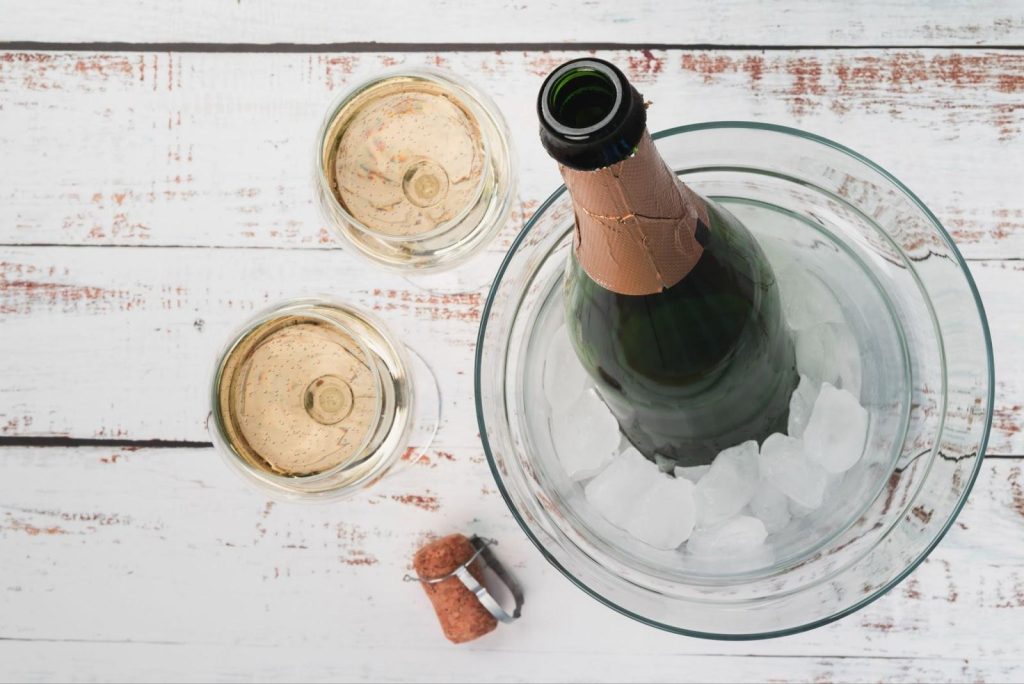Ever found yourself with an unfinished bottle of wine and wondered if you could save it for another day? At this point, you may be asking yourself, “Hmm…can I freeze wine without affecting its taste?”.
Let’s look at everything about freezing wine, from the science behind it to practical tips for different varieties.
Can You Freeze Wine: The Answer
You can freeze wine, but the process requires more attention than simply placing a bottle in the freezer.
Wine contains complex compounds that react differently to freezing temperatures. When wine freezes, the water content expands while the alcohol remains liquid. This process changes both the texture and taste of your wine.
Consider freezing as a way to pause your wine’s aging rather than preserving its perfect state.
Here are a few details to know when freezing wine:
|
Aspect |
Details |
|
Freezing Temperature |
15-20°F (-9 to -6°C) |
|
Recommended Containers |
Ice cube trays, mason jars, freezer-safe bags |
|
Storage Duration |
Best for short-term storage |
|
Best Uses |
Cooking, wine slushies, sangria |
|
Thawing Time |
Overnight in fridge or few hours on counter |
Does Freezing Wine Damage It?
Think of wine as a delicate orchestra, where each instrument represents different flavor compounds, aromas, and textures working in perfect harmony. When you freeze wine, you essentially interrupt this symphony.
The freezing process primarily affects wine in three key ways:
- The water molecules in wine expand as they freeze, which can disrupt the wine’s structural integrity.
- Alcohol and water separate during freezing, potentially altering the wine’s carefully balanced composition.
- Cold temperatures can cause tartaric acid crystals to form, which might affect both texture and taste.
Certain changes may go unnoticed for daily table wines, especially if you plan to use them for cooking. When premium or aged wines are frozen, subtle characteristics that make these wines special are lost. Within a fine Burgundy, delicate notes might disappear, as well as complex tertiary aromas in an aged Bordeaux.
The good news? Freezing won’t make your wine unsafe to drink. While the taste might change, you won’t risk any health concerns by freezing and thawing wine properly.
So you can consider freezing as a practical solution for wines you’ll use in cooking or casual drinking. If you want to age it further, freezing is not recommended.
Also read: How Long Does Wine Last in the Fridge
Pros and Cons of Freezing Wine
Before you reach for that freezer door, consider these advantages and disadvantages:
|
Pros |
Cons |
|
Extended storage for cooking |
Potential loss of subtle flavors |
|
Perfect for wine cocktails |
Texture changes after thawing |
|
Reduces food waste |
Not ideal for premium wines |
|
Convenient for recipes |
May affect wine’s aroma |
|
Creates wine ice cubes |
Limited drinking quality |
Can you Freeze Red Wine?
Red wine can be frozen, but you can expect a few changes.
The tannins in red wine might become more pronounced after freezing and thawing. While this might affect your drinking experience, frozen red wine remains excellent for cooking, especially in rich sauces and hearty stews.
On the other hand, the concentrated flavours can actually enhance your culinary creations.
Can You Freeze White Wine?
Yes, you can freeze white wine. And, white wine generally freezes better than red wine due to its lighter structure.
The crisp, acidic notes often remain more stable through the freezing process. It’s particularly suitable for creating frozen wine cubes for summer spritzers or adding to seafood dishes. However, delicate white wines might lose some of their subtle aromatic compounds.
Can You Freeze Sparkling Wine?
Freezing sparkling wine is not recommended. The carbonation creates additional pressure during freezing, which can lead to burst bottles or lost effervescence.
If you must preserve sparkling wine, specialised sparkling wine stoppers are a better solution than freezing.
How Do You Freeze Leftover Wine?
Freezing wine the right way can make all the difference. Let us guide you through a detailed process of freezing your leftover wine to ensure you preserve its quality as much as possible:
-
Choose The Right Container
Start by selecting a container that will protect your wine in the freezer.
Ice cube trays work perfectly for small portions you’ll use in cooking. For larger amounts, pick a mason jar or a high-quality freezer bag. The container must be freezer-safe to prevent cracking under cold temperatures.
-
Wine Consumes Space
Wine expands as it freezes, so never fill your container to the brim. Follow the 3/4 rule – fill your chosen container only three-quarters full.
This extra space prevents the expanding liquid from pushing against the lid or breaking the container.
-
Follow a Proper Label System
Take a moment to label each container with essential information.
This system helps you track how long your wine has been frozen and what you’re working with when it’s time to use it.
-
Place the Wine Bottle At a Correct Freezing Position
Store containers upright. For bags, freeze them flat on a baking sheet first, then store them vertically to save space.
-
Control the Temperature
Set your freezer to 0°F (-18°C) or slightly below. While wine freezes at a higher temperature, this colder setting helps maintain consistency and prevents partial thawing if your freezer door opens frequently.
Conclusion
It is not only possible to freeze wine but it’s practical too, especially for keeping one’s favourite vintage for cooking or sipping.
Although it won’t preserve the wine in its complete character, it is a wonderful precaution against waste that extends your culinary opportunities.
With the right approach, you can freeze most of your wines without damaging it.
Ready to Explore More Wine Experiences?
Looking for an exquisite wine bar in Ubud? Visit us at Belle Wine & Grazing Boards.
Our wine experts will guide you through an extensive selection of perfectly stored wines, ensuring each glass captures the true essence of its origins.



